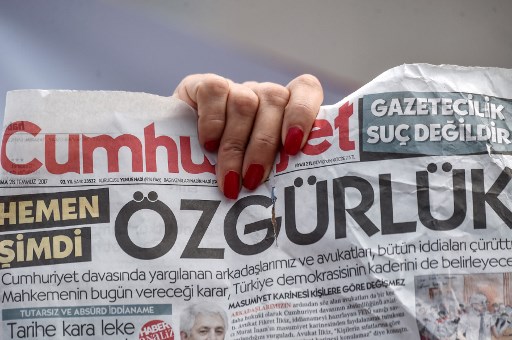Journalists in Turkey facing more and more imprisonment

November was a difficult month again for imprisoned and prosecuted journalists in Turkey. More and more professional journalists and media workers are facing imprisonment or threats for reporting information or simply for being affiliated to specific media outlets, wrongly considered by Turkish authorities as criminal acts.
On 21 November 2017, journalist Oğuz Güven, editor-in-chief of the online version of Cumhuriyet daily newspaper, was sentenced to 3 years and 1 month of imprisonment due to a temporary tweet which Mr Güven had sent and quickly deleted regarding the accidental death of a public prosecutor. Mustafa Alper, the Chief Public Prosecutor of Denizli, died in a traffic accident in May. Güven tweeted about the incident via the Cumhuriyet newspaper’s Twitter account, but deleted the tweet after 55 seconds. His tweet was interpreted by Turkish authorities as a retaliation act, because he had sought the first warrants against the members of the illegal group FETÖ, allegedly behind the failed coup attempt of July 2016 in Turkey.
Güven was arrested on 12 May 2017 and was originally sentenced to over 23 years’ imprisonment, which was reduced after several trials. He was sentenced for the crime of publishing the statements of terrorist organisations, as he is accused of supporting illegal “terrorist” groups (PKK and FETÖ). The Secretary General of the Journalists’ Association of Turkey (TGC, an EFJ-IFJ affiliate), Sibel Günes, said: “Our colleague has been sentenced to 3 years 1 month of imprisonment for a simple title and this case shows again that Turkey is still remaining in the list of countries where there is no press freedom. We as journalists are the most affected by this situation.We are once again demanding the release of all jailed journalists”.
Another emblematic case on 21 November 2017 featured Ayşenur Parıldak, a 27-year old law student and former journalist for Zaman daily newspaper. She was also sentenced to 7 years and 6 months’ imprisonment on charges of alleged “membership to a terrorist organisation”. Mrs Parıldak was working as a reporter from the now-closed Zaman daily newspaper, and had been arrested on 11 August 2016 on suspicion of being a member of the same illegal FETÖ organisation. She was also accused of using the encryption system ByLock mobile app, which Turkish authorities believe is linked to FETÖ members, yet Parıldak denied using this app during the hearings. Zaman newspaper was also shut down due its ties with the illegal group.
“The only offence I was involved in is to work for Zaman newspaper. I wish I had not. All the leading figures from the newspaper went abroad tweeting about press freedom. I demand my acquittal and release,” Parıldak said. “I want to be acquitted. I am so exhausted.”
Parıldak was originally sentenced to 9 years’ imprisonment, reduced now to 7,5 years.
On 13 November 2017, journalists and brothers Ahmet and Mehmet Altan stood trial. They, along with Nazlı Ilıcak, face three aggravated life sentences for supposedly committing crimes on behalf of FETÖ. The hearings of the Altans, Ilıcak and four other journalists will resume on 11 December 2017.
The European and International Federations of Journalists (EFJ-IFJ), together with the Journalists Union of Turkey (TGS), are currently running the project #JournalismIsNotACrime, with the aim of promoting and protecting fundamental rights in Turkey through enhancing the role of journalists in promoting democracy, good governance and the public’s right to information. As part of the project, the EFJ monitors jailed journalists in Turkey and encourages everybody to send them postcards and attend the press trials in Turkey.
Photo credit: Ozan Kose / AFP






